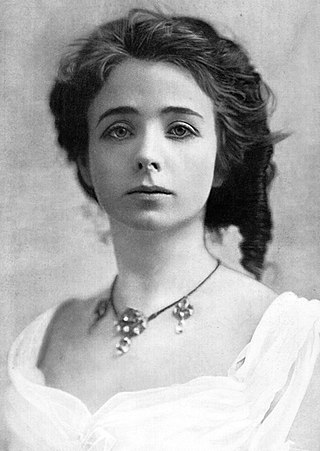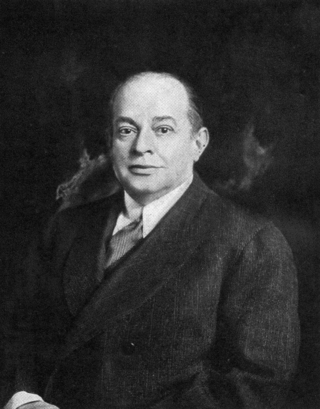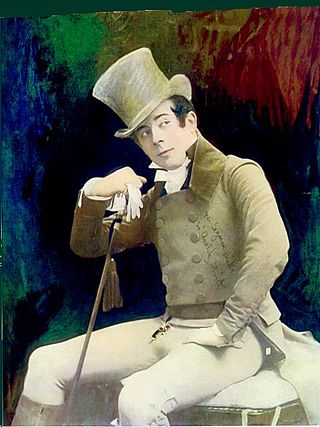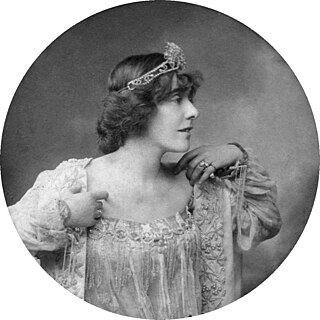
Sir James Matthew Barrie, 1st Baronet, was a Scottish novelist and playwright, best remembered as the creator of Peter Pan. He was born and educated in Scotland and then moved to London, where he wrote several successful novels and plays. There he met the Llewelyn Davies boys, who inspired him to write about a baby boy who has magical adventures in Kensington Gardens, then to write Peter Pan, or The Boy Who Wouldn't Grow Up, a 1904 West End "fairy play" about an ageless boy and an ordinary girl named Wendy who have adventures in the fantasy setting of Neverland.

Maude Ewing Adams Kiskadden, known professionally as Maude Adams, was an American actress and stage designer who achieved her greatest success as the character Peter Pan, first playing the role in the 1905 Broadway production of Peter Pan; or, The Boy Who Wouldn't Grow Up. Adams' personality appealed to a large audience and helped her become the most successful and highest-paid performer of her day, with a yearly income of more than one million dollars during her peak.

Charles Frohman was an American theater manager and producer, who discovered and promoted many stars of the American stage. Frohman produced over 700 shows, and among his biggest hit was Peter Pan, both in London and the US.

Maude Fealy was an American stage and silent film actress whose career survived into the sound era.

Dame Irene Vanbrugh DBE was an English actress. The daughter of a clergyman, Vanbrugh followed her elder sister Violet into the theatrical profession and sustained a career for more than 50 years.

Anna Alice Chapin was an American author and playwright. She wrote novels, short stories, fairy tales and books on music, but is perhaps best remembered for her 1904 collaboration with Glen MacDonough on the child's book adaptation of the Babes in Toyland operetta.

Quality Street is a comedy in four acts by J. M. Barrie, written before his more famous work Peter Pan. The story is about two sisters who start a school "for genteel children".

Filmzauber, literally 'Film Magic', is a Posse mit Gesang in four scenes by Walter Kollo and Willy Bredschneider, with a German libretto by Rudolf Bernauer and Rudolph Schanzer. A parody of silent films, Filmzauber premiered in Berlin in 1912. An English version, The Girl on the Film, translated and adapted by James T. Tanner with additional music by Albert Szirmai, premiered in London in 1913 and was later performed in New York and elsewhere.

Clarence Charles William Henry Richard Bennett was an American actor who became a stage and silent screen actor over the early decades of the 20th century. He was the father of actresses Constance Bennett, Barbara Bennett and Joan Bennett with actress Adrienne Morrison, his second wife.

Three New York City playhouses named Wallack's Theatre played an important part in the history of American theater as the successive homes of the stock company managed by actors James W. Wallack and his son, Lester Wallack. During its 35-year lifetime, from 1852 to 1887, that company developed and held a reputation as the best theater company in the country.

What Every Woman Knows is a four-act play written by J. M. Barrie. It was first presented by impresario Charles Frohman at the Duke of York's Theatre in London on 3 September 1908. It ran for 384 performances, transferring to the Hicks Theatre between 21 December 1908 and 15 February 1909.

Frederic Lewis Tuffley, better known by his stage name, Eric Lewis, was an English comedian, actor and singer. In a career spanning five decades, he starred in numerous comedies and in a few musical comedy hits, but he is probably best remembered today as the understudy to George Grossmith in the Gilbert & Sullivan comic operas of the 1880s who left the D'Oyly Carte Opera Company just in time to give Henry Lytton his big break.

Oswald Yorke(néeOswald Parkinson Harker; 24 November 1866 – 25 January 1943) was a British character actor who had a near sixty-year career performing on both sides of the Atlantic.

Arthur John Maude was an English actor, screenwriter, and film director.
The Garden Theatre was a major theatre on Madison Avenue and 27th Street in New York City, New York. The theatre opened on September 27, 1890, and closed in 1925. Part of the second Madison Square Garden complex, the theatre presented Broadway plays for two decades and then, as high-end theatres moved uptown to the Times Square area, became a facility for German and Yiddish theatre, motion pictures, lectures, and meetings of trade and political groups.

Constance Crawley was an English actress best known for leading roles in Shakespeare tragedies. She gained notice on the American stage at the start of the 20th century, and later starred in and wrote several silent films.

The Empire Theatre in New York City was a prominent Broadway theatre in the first half of the twentieth century.

Finding Neverland is a musical with music and lyrics by Gary Barlow and Eliot Kennedy and a book by James Graham adapted from the 1998 play The Man Who Was Peter Pan by Allan Knee and its 2004 film version Finding Neverland. An early version of the musical made its world premiere at the Curve Theatre in Leicester in 2012 with a book by Allan Knee, music by Scott Frankel and lyrics by Michael Korie. A reworked version with the current writing team made its world premiere in 2014 at the American Repertory Theater in Cambridge, Massachusetts. Following completion of its Cambridge run, the production transferred to Broadway in March 2015.

Lady Babbie is a lost 1913 American silent drama film produced by the United States division of the French film company Eclair. The featurette was written and directed by Oscar A. C. Lund, a native of Sweden, who also costarred in the three-reeler opposite Barbara Tennant as Lady Babbie. That role was loosely based on a popular character originally performed by American actress Maude Adams in the 1897 Broadway production The Little Minister, a play adapted from the 1891 novel of the same title by Scottish writer J. M. Barrie. Filming for this motion picture was done at Eclair's studio facilities in Fort Lee, New Jersey and on location at Lake George, New York.
Diplomacy is an 1878 English play which is a translation and adaptation by B. C. Stephenson and Clement Scott of the 1877 French play Dora by Victorien Sardou. It saw frequent revivals and was a popular play for over fifty years.


















